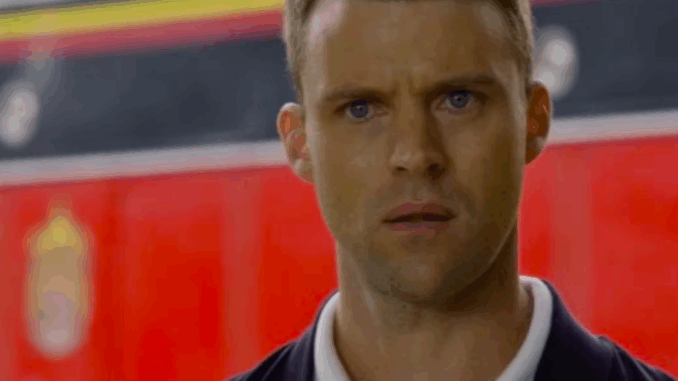
Matthew Casey has always stood at the center of Chicago Fire’s emotional storm. From the very first episode, Jesse Spencer’s portrayal of the stoic, principled, and often deeply conflicted firefighter gave the show its moral backbone. But as Chicago Fire enters its twelfth season, Casey’s legacy has taken on new dimensions—marked not just by heroism, but by the pain, love, and loyalty that have shaped him.
Casey may have moved to Oregon, but his shadow still looms large over Firehouse 51—and over the hearts of those who served beside him.
A Hero with Heavy Shoulders
Casey’s story has always been one of burden. Even in the early seasons, while leading Truck 81, Casey bore the weight of loss and responsibility like armor. The deaths of Andy Darden, Hallie Thomas, and later, so many others—including the near-fatal collapse of Dawson’s marriage—weren’t just character-defining moments. They were emotional scars that Casey carried with him in every decision he made on the job.
Unlike the firehouse’s more impulsive leaders, Casey’s command style was deliberate, measured, and often distant. But beneath that calm exterior was a man who bled for every life lost and every rookie injured under his watch.
Season 10 saw a turning point. When Casey chose to leave Chicago and care for the Darden boys in Oregon, fans were gutted—but it made sense. Casey wasn’t running away. He was choosing duty over comfort. And that’s who he’s always been.
Brettsey: The Love That Couldn’t Stay
Perhaps no storyline encapsulates Casey’s internal conflict better than his romance with paramedic Sylvie Brett. Their relationship was a slow burn—painfully, beautifully slow. For seasons, viewers watched as they hesitated, reached for one another, pulled back, and finally fell.
But just as things seemed solid, life intervened. Casey’s move to Oregon and Brett’s reluctance to follow created a heartbreaking rift. Yet even in distance, the love lingered. And when Casey returned for the 200th episode—and again in Season 11—it became clear: love doesn’t always look like a fairy tale.
Their wedding in Season 12, Episode 7 was a moment fans had long hoped for. It wasn’t grand. It wasn’t flashy. But it was honest. Brett and Casey knew who they were, what they’d been through, and what it took to come back to each other. That’s why the ceremony—quiet, with the firehouse looking on—felt like a homecoming.
Still, Casey’s return was never meant to be permanent. His responsibilities in Oregon remained, and after the honeymoon, he left again. Not in abandonment—but in bittersweet truth. Sometimes love survives by letting go.
A Leader Remembered
Even in absence, Casey’s leadership continues to shape Firehouse 51. His influence is felt in how Kidd handles conflict, how Gallo approaches risk, and how Boden talks about integrity.
Season 12 includes several callbacks to Casey’s strategies, including a pivotal moment in Episode 4 when Gallo quotes him during a post-rescue debrief: “We don’t leave chaos. We leave clarity.” That line, first spoken by Casey in Season 6, reminds viewers that his ethos still runs through the team.
Even Severide, who has often bristled at authority, acknowledged Casey’s leadership in a recent conversation with Boden: “We didn’t always agree, but Casey made you want to be better. That’s rare.”
Jesse Spencer’s Enduring Impact

Jesse Spencer has remained one of the most respected figures in the Chicago Fire universe. His decision to step away from the show in Season 10 was met with understanding—he wanted to spend more time with family and explore life beyond the grind of a network drama.
Yet his loyalty to the One Chicago universe has never wavered. His multiple returns have sparked emotional peaks for the series and reconnected fans to the heart of the show’s early seasons. Few actors can disappear and re-enter a long-running series with such ease, but Spencer has that rare gift—he carries the show’s weight even when he’s not in the room.
In interviews, Spencer has said: “Casey has been through hell and back, but he’s still standing. I think people connect with that. He’s not perfect. He’s just trying to do the right thing.”
The Legacy of Loss and Loyalty
Casey’s story isn’t about perfection. It’s about perseverance. He’s been bruised by tragedy, hardened by duty, and softened by love. He’s made mistakes—some of them massive—but he’s never abandoned his moral compass. And that’s why his legacy is so enduring.
In the fictional world of Chicago Fire, Casey’s name is still spoken with reverence. In Season 12, Herrmann tells a new recruit, “Casey’s not here. But you’d do well to follow the example he left behind.” That’s more than nostalgia. That’s a mission.
Final Thoughts
Matthew Casey may not be wearing the Chicago Fire patch on his shoulder anymore, but his presence is still stitched into every call, every choice, and every beat of Firehouse 51. Through tragedy, through love, through every test of loyalty—he’s remained exactly what this show needed: a quiet hero, always standing for what’s right, even when it breaks his heart.